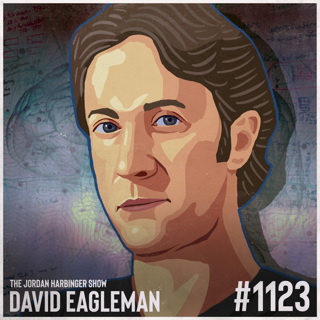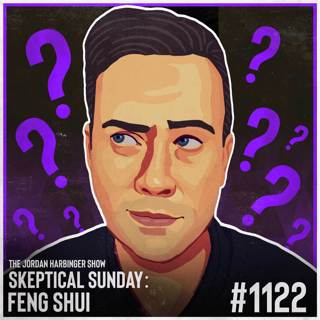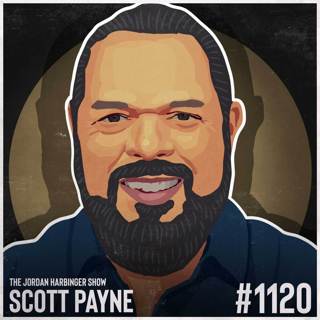
1123: David Eagleman | Your Prehistoric Brain on Modern Problems
David Eagleman explains why counterfeiting works, how our empathy fails, why mind reading remains elusive, and if we'll ever upload our minds to computers. What We Discuss with David Eagleman: Dr. David Eagleman worked with the European Central Bank on anti-counterfeiting measures, and his research revealed that most people don't notice security features on bills. His key recommendation was to use faces rather than buildings for watermarks since our brains have specialized neural real estate for recognizing faces, making counterfeit detection easier. Research shows our brains have less empathy for people we consider part of our "outgroup." FMRI studies demonstrated that even simple one-word labels (like religious affiliations) can trigger this differential response in the brain's pain matrix when witnessing someone experiencing pain. True mind reading via brain scanning is likely impossible in our lifetime. While we can decode basic sensory input (like visual or auditory cortex activity), actual thoughts involve complex personal experiences, memories, and creative combinations that would be impossible to capture without knowing someone's entire life history. Uploading a human brain to digital form presents enormous technical challenges and philosophical questions. The computational requirements exceed our current global capacity, and questions about identity (is the upload "you" if your physical body dies?) remain unresolved. Brain plasticity would also need to be captured for the upload to remain dynamic. Understanding our brain's natural tendency toward ingroup/outgroup thinking gives us the opportunity to consciously overcome these biases. By recognizing our shared humanity and finding common interests with those different from us, we can build bridges across divides and develop greater empathy for all people. This awareness can help us make more compassionate choices in our daily interactions. And much more... Full show notes and resources can be found here: jordanharbinger.com/1123 And if you're still game to support us, please leave a review here — even one sentence helps! Consider including your Twitter handle so we can thank you personally! This Episode Is Brought To You By Our Fine Sponsors: jordanharbinger.com/deals Sign up for Six-Minute Networking — our free networking and relationship development mini course — at jordanharbinger.com/course! Subscribe to our once-a-week Wee Bit Wiser newsletter today and start filling your Wednesdays with wisdom! Do you even Reddit, bro? Join us at r/JordanHarbinger!See Privacy Policy at https://art19.com/privacy and California Privacy Notice at https://art19.com/privacy#do-not-sell-my-info.
4 Mars 1h 9min

1122: Feng Shui | Skeptical Sunday
Feng Shui: ancient wisdom or modern woo? On Skeptical Sunday, Dave Farina unpacks how "chi" and "energy" get misappropriated in the name of interior design! Welcome to Skeptical Sunday, a special edition of The Jordan Harbinger Show where Jordan and a guest break down a topic that you may have never thought about, open things up, and debunk common misconceptions. This time around, we’re joined by Is This Wi-Fi Organic?: A Guide to Spotting Misleading Science Online author and host of the Professor Dave Debates podcast (as well as the Professor Dave Explains YouTube channel), Dave Farina! On This Week's Skeptical Sunday: The ancient Chinese practice of Feng Shui centers around three principles: commanding position (placing main furniture strategically in relation to doors), bagua (an "energy map" dividing spaces into eight areas representing aspects of life like wealth and career), and the five elements (earth, metal, water, wood, and fire) used to address specific needs. Terms like "energy," "frequency," and "vibration" have precise scientific definitions but are repurposed in Feng Shui with vague, mystical meanings. In physics, energy means "capacity to do work," while frequency refers to cycles per unit time—not the nebulous concepts suggested in mystical practices. Feng Shui conflates subjective aesthetic choices (appropriate for an art form like interior design) with objective claims about physical reality. While interior design is guided by aesthetic criteria, Feng Shui makes unfounded assertions about "chi," luck, and energy flows that lack empirical evidence. Many reported benefits of Feng Shui likely stem from placebo effects — feeling more energized because you expect to feel more energized in a particular arrangement. This psychological phenomenon explains why believers experience results while skeptics don't. Strip away the pseudoscientific claims, and Feng Shui contains genuinely useful design principles. Many of its recommendations—like keeping entryways clear, creating balanced spaces, and mindfully arranging furniture — make intuitive sense and can genuinely improve your living environment. These aesthetic guidelines can be appreciated and applied without embracing unfounded mystical claims, allowing you to create harmonious spaces based on practical design wisdom rather than magical thinking. Connect with Jordan on Twitter, Instagram, and YouTube. If you have something you'd like us to tackle here on Skeptical Sunday, drop Jordan a line at jordan@jordanharbinger.com and let... See Privacy Policy at https://art19.com/privacy and California Privacy Notice at https://art19.com/privacy#do-not-sell-my-info.
2 Mars 41min

1121: Ethics Expire with Doctor's Desire | Feedback Friday
A friend slept with a mentally ill patient, got caught in a web of manipulation, and calls you judgmental for questioning her ethics. It's Feedback Friday! And in case you didn't already know it, Jordan Harbinger (@JordanHarbinger) and Gabriel Mizrahi (@GabeMizrahi) banter and take your comments and questions for Feedback Friday right here every week! If you want us to answer your question, register your feedback, or tell your story on one of our upcoming weekly Feedback Friday episodes, drop us a line at friday@jordanharbinger.com. Now let's dive in! On This Week's Feedback Friday: You discovered your friend, a physician, had a 2.5-year affair with a mentally ill, drug-addicted patient. When the relationship turned abusive and eventually was exposed, your friend lost her job and had her medical license suspended. Now she's accusing you of victim-blaming when you express concern about her ethics. Where's the line between accountability and compassion? Your immigrant parents were physically and emotionally abusive, and you played a key role in raising your siblings. Now your family treats your husband warmly while maintaining a cold relationship with you. Your husband, who relies on your support with his own difficult family, doesn't stand up for you. How do you navigate this painful dynamic? Your company of 15 years is relocating headquarters to a major metropolis, and you must decide whether to move with them or stay put. Only 10-20% of employees are expected to relocate, and the severance package requires staying until a specific date. Do you jump ship now, or wait it out in a potentially deteriorating work environment to secure your severance? Recommendation of the Week: Baylen Out Loud You previously wrote in about being catfished by your wife's cousin's boyfriend who was using his ex-girlfriend's photos. Now there's been a major development: the cousin discovered his messaging and kicked him out, revealing his pattern of using those photos to "test" men's fidelity. Despite these red flags, you're still drawn to him and considering pursuing a connection. Is this worth the risk? Have any questions, comments, or stories you'd like to share with us? Drop us a line at friday@jordanharbinger.com! Connect with Jordan on Twitter at @JordanHarbinger and Instagram at @jordanharbinger. Connect with Gabriel on Twitter at @GabeMizrahi and Instagram @gabrielmizrahi. Full show notes and resources can be found here: jordanharbinger.com/1121 See Privacy Policy at https://art19.com/privacy and California Privacy Notice at https://art19.com/privacy#do-not-sell-my-info.
28 Feb 1h 26min

1120: Scott Payne | How the FBI Turned Me Into the Perfect Outlaw
FBI veteran Scott Payne takes us into the world of undercover ops: infiltrating biker gangs, near-death moments, and the psychological toll of betrayal. What We Discuss with Scott Payne: Scott Payne worked undercover for the FBI infiltrating The Outlaws motorcycle gang, forming relationships with dangerous criminals over an 18-month period to gather evidence on crimes including drug trafficking, stolen vehicles, and potential connections to murder. Scott's undercover work involved serious personal danger, including a harrowing experience where he was strip-searched in the basement of the gang's clubhouse while wearing recording devices that could have gotten him killed if discovered. The psychological toll of undercover work is significant — Scott describes forming genuine friendships with targets that he ultimately had to betray, as well as physical and mental exhaustion that led to a breakdown during the operation. The FBI has developed safeguards for undercover agents' mental health, including psychological assessments and contact agents who provide support and maintain the agent's connection to their real identity during long undercover operations. Success in undercover work depends on authenticity and adaptability. Rather than completely fabricating a persona, Payne maintained aspects of his true self while adjusting to his environment, allowing him to build believable relationships and respond naturally in high-pressure situations. This approach — staying true to your core self while adapting to challenging circumstances — can be applied in many professional and personal situations requiring resilience. And much more... Full show notes and resources can be found here: jordanharbinger.com/1120 And if you're still game to support us, please leave a review here — even one sentence helps! Consider including your Twitter handle so we can thank you personally! This Episode Is Brought To You By Our Fine Sponsors: jordanharbinger.com/deals Sign up for Six-Minute Networking — our free networking and relationship development mini course — at jordanharbinger.com/course! Subscribe to our once-a-week Wee Bit Wiser newsletter today and start filling your Wednesdays with wisdom! Do you even Reddit, bro? Join us at r/JordanHarbinger!See Privacy Policy at https://art19.com/privacy and California Privacy Notice at https://art19.com/privacy#do-not-sell-my-info.
25 Feb 1h 26min

1119: Home Schooling | Skeptical Sunday
Homeschooling: Not just for doomsday preppers anymore! Nick Pell joins Skeptical Sunday to unpack how kitchen tables became the new classroom battleground. On This Week's Skeptical Sunday: Homeschooling exploded from 2.5 million kids in 2019 to a whopping 6 million by 2021-2022, with most families sticking to it even after the pandemic dust settled. Forget the stereotype of homeschooling being a luxury for the wealthy — it's actually surprisingly affordable. While private schools can demand $25,000+ per year, homeschooling typically ranges from $500-$2,500 annually. Homeschooled students who pursue higher education tend to outperform their traditionally schooled peers in college, though they might stumble a bit in math (because calculus is still calculus, whether you learn it at home or in a classroom). Contrary to the classic "awkward homeschooler" trope, research shows mixed results on social development. Like a scientific experiment with conflicting data, some studies show better social skills, others show worse, and some land right in the middle. The key variable? Social involvement — it turns out that being social makes you, well, social. Want to explore homeschooling? Start by recognizing that it's never too late to begin, and you don't need special qualifications or a teacher's license in most states. Like any good adventure, success comes down to research, understanding your child's needs, and trusting your parental instincts. The best part? You can customize the education to fit your child's learning style, pace, and interests. Connect with Jordan on Twitter, Instagram, and YouTube. If you have something you'd like us to tackle here on Skeptical Sunday, drop Jordan a line at jordan@jordanharbinger.com and let him know! Full show notes and resources can be found here: jordanharbinger.com/1119 And if you're still game to support us, please leave a review here — even one sentence helps! Consider including your Twitter handle so we can thank you personally! This Episode Is Brought To You By Our Fine Sponsors: jordanharbinger.com/deals Sign up for Six-Minute Networking — our free networking and relationship development mini course — at jordanharbinger.com/course! Subscribe to our once-a-week Wee Bit Wiser newsletter today and start filling your Wednesdays with wisdom! Do...See Privacy Policy at https://art19.com/privacy and California Privacy Notice at https://art19.com/privacy#do-not-sell-my-info.
23 Feb 50min

1118: Son's Safety Vexed by Schizoaffective Ex | Feedback Friday
Your ex's schizoaffective episodes keep getting court-approved showtime with your special-needs child, despite restraining orders. It's Feedback Friday! And in case you didn't already know it, Jordan Harbinger (@JordanHarbinger) and Gabriel Mizrahi (@GabeMizrahi) banter and take your comments and questions for Feedback Friday right here every week! If you want us to answer your question, register your feedback, or tell your story on one of our upcoming weekly Feedback Friday episodes, drop us a line at friday@jordanharbinger.com. Now let's dive in! On This Week's Feedback Friday, We Discuss: You're raising a special-needs child in Norway while locked in an endless dance with a legal system that keeps inviting your ex — who has a documented history of violent psychotic episodes — to waltz back into your lives despite restraining orders. How do you protect your child when the system seems determined to tango with danger? You're watching L.A.'s recent wildfire coverage from your Northern California community, where neighbors still camp in RVs after losing everything to even larger infernos. It's like screaming into the void while celebrities get prime-time attention for their lost pool houses. How do you process this disparity in coverage and support? Your professor treats student assistants like Victorian servants, dismisses them mid-sentence, and weaponizes awkward silences. How do you co-exist with someone who has such authority while preserving your dignity? Diagnosed with paranoid personality disorder 20 years ago, your mother, once grounded in reality, now believes you've infected her brain with parasites and refuses to leave her house or see doctors. It's like watching someone slowly slip through your fingers while the legal system shrugs. How do you help someone who sees such help as a threat? Recommendation of the Week: Audit your medicine expiration dates. After three years of orchestrating your life around your rescue dog's careful medical routine, you've had to say goodbye. Like a cruel cosmic joke, it caps off two years of personal earthquakes — layoffs, moves, heartbreaks. Seemingly sharing in the act of mourning, your other dog howls at the pawprint box. How do you rebuild when grief keeps redecorating? Have any questions, comments, or stories you'd like to share with us? Drop us a line at friday@jordanharbinger.com! Connect with Jordan on Twitter at @JordanHarbinger and Instagram at @jordanharbinger. Connect with Gabriel on Twitter at @GabeMizrahi and Instagram @gabrielmizrahi. Like this show? Please leave us a review here — even... See Privacy Policy at https://art19.com/privacy and California Privacy Notice at https://art19.com/privacy#do-not-sell-my-info.
21 Feb 1h 11min

1117: Anne Applebaum | Inside The Fortune 500 of Modern Dictatorships
From Russia to China: Autocracy, Inc. author Anne Applebaum reveals how modern autocrats create a new world order by working together against democracy. What We Discuss with Anne Applebaum: Modern autocracies form opportunistic networks rather than ideological blocs, collaborating through financial interests, technology sharing, and mutual support against democratic ideals — despite having different political systems. Russia's invasion of Ukraine represents a deliberate challenge to international law and norms, with Putin demonstrating he can violate conventions without consequences. China's surveillance technology has evolved to potentially predict political dissent by combining online monitoring, real-world tracking, and AI analysis — and this technology is being exported to other authoritarian regimes. The decline of democracy is typically gradual, often taking decades as institutions are slowly undermined, while many citizens may not realize their democracy is eroding until it becomes impossible to elect alternative leadership. Citizens can strengthen democracy through active local engagement: participating in local politics, joining community organizations, and building real-world connections across political divides. This practical involvement in addressing concrete local issues helps counter online polarization and maintain democratic resilience. And much more... Full show notes and resources can be found here: jordanharbinger.com/1117 And if you're still game to support us, please leave a review here — even one sentence helps! Consider including your Twitter handle so we can thank you personally! This Episode Is Brought To You By Our Fine Sponsors: jordanharbinger.com/deals Sign up for Six-Minute Networking — our free networking and relationship development mini course — at jordanharbinger.com/course! Subscribe to our once-a-week Wee Bit Wiser newsletter today and start filling your Wednesdays with wisdom! Do you even Reddit, bro? Join us at r/JordanHarbinger!See Privacy Policy at https://art19.com/privacy and California Privacy Notice at https://art19.com/privacy#do-not-sell-my-info.
18 Feb 1h 10min

1116: Fake Foods | Skeptical Sunday
From food deserts to ultra-processed flavor deception, Jessica Wynn maps out America's nutritional divide and corporate food games on Skeptical Sunday! Welcome to Skeptical Sunday, a special edition of The Jordan Harbinger Show where Jordan and a guest break down a topic that you may have never thought about, open things up, and debunk common misconceptions. This time around, we’re joined by Jessica Wynn! On This Week's Skeptical Sunday, We Discuss: Imagine your body as an ancient supercomputer, humming along with software that's been fine-tuned over millions of years. Then suddenly, ultra-processed foods show up like a sketchy software update, introducing code your system never evolved to handle. The result? Your internal operating system goes haywire, consuming 500 extra calories daily even when the nutritional "specs" look identical on paper. Remember that Italian restaurant scene in Goodfellas? Well, the real food mafia (yes, the actual "Agromafia") is less about fancy dinners and more about fancy fraud. They're orchestrating a culinary shell game where your exotic $35 "Chilean Sea Bass" is actually $7 Costco tilapia in disguise, and your "extra virgin" olive oil might have a considerably less virtuous past. That plant-based burger patty might be wearing a hemp necklace and preaching about sustainability, but underneath its eco-friendly costume lurks an ultra-processed food wolf in sheep's clothing. It's the dietary equivalent of greenwashing — solving one problem while potentially creating a lab full of new ones. Picture 40 million Americans living in food deserts — urban landscapes where fresh produce is as rare as a unicorn sighting. These nutritional wastelands force folks to survive on a diet of convenience store cuisine, creating a tragic cycle where the most affordable food options are often the ones most likely to compromise health. It's a modern-day dietary dystopia. Here's the silver lining, food adventurers! Think of your grocery store as a game board: The real treasures are hidden along the perimeter — that's where the fresh produce, meats, and dairy hang out like nutritional VIPs. Stick to the edges, and you'll dodge the ultra-processed center like a dietary ninja. Want to level up? Grind your own coffee beans, befriend your local farmers market vendors, and remember: every whole food purchase is a vote for a healthier food system. Connect with Jordan on Twitter, Instagram, and YouTube. If you have something you'd like us to tackle here on Skeptical Sunday, drop Jordan a line at jordan@jordanharbinger.com and let him know! Connect with Jessica Wynn at Instagram and Threads, and subscribe to her newsletter: Between the Lines! See Privacy Policy at https://art19.com/privacy and California Privacy Notice at https://art19.com/privacy#do-not-sell-my-info.
16 Feb 55min






















